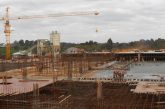
Cement consumption has recorded an increase as construction sector rebounds after a tough Covid-19 season. This is according data from the Kenya National Bureau of Statistics.
The data showed that consumption of cement stood at 3.35 million tonnes in January to May, compared to 2.64 million tonnes in the corresponding period last year. The jump in consumption is partly attributed to public infrastructure projects such as the Nairobi Expressway.
According to Transport CS James Macharia, the expressway takes up to 1,000 bags of cement daily and all these are purchased locally. On a monthly basis, the quantity of cement produced increased from 688,512 tonnes in April to 710,228 tonnes in May 2021. Consumption of cement also rose from 677,411 tonnes in April to 700,450 tonnes in May 2021.
Stable sector
“Cement production has been strong, aligned with consumption of the product. This has been supported in part by the strong government infrastructure spending,” said Central Bank of Kenya governor Patrick Njoroge during.
Construction is one of the sectors of the economy that has remained stable over the pandemic period, despite cement consumption dropping to a four-month low in February. This came as investors either froze or scaled down construction projects on the economic uncertainty caused by the pandemic.
Even though developers continued their projects, they reduced their headcount on sites to comply with the social distancing rule, hence, the drop in consumption. Low demand for office space as companies adopt working from home formulas has also seen new projects dip.
Reduced activities in the infrastructure and real estate sectors affected uptake of cement last year, but this has started to stabilize. According to the Architectural Association of Kenya, improvement in the sector is attributed to the steady economic recovery with the easing of Covid-19 measures. Ongoing projects such as the upgrade of James Gichuru-Rironi highway, the Nairobi Western Bypass and the affordable housing projects are expected to sustain consumption.





